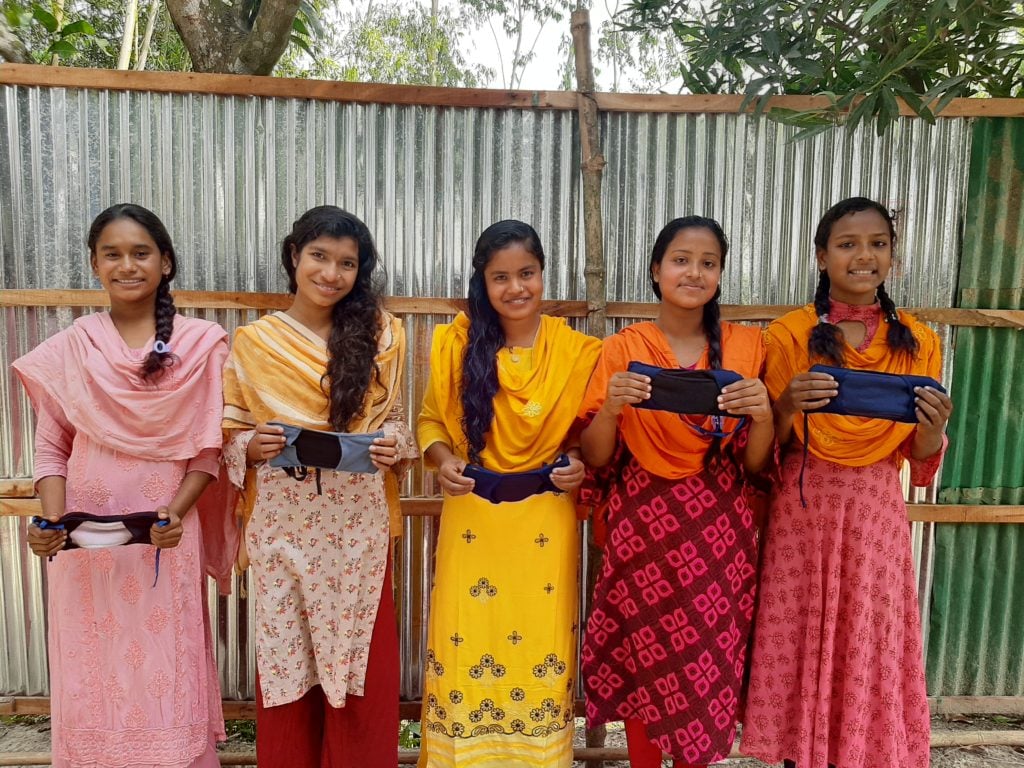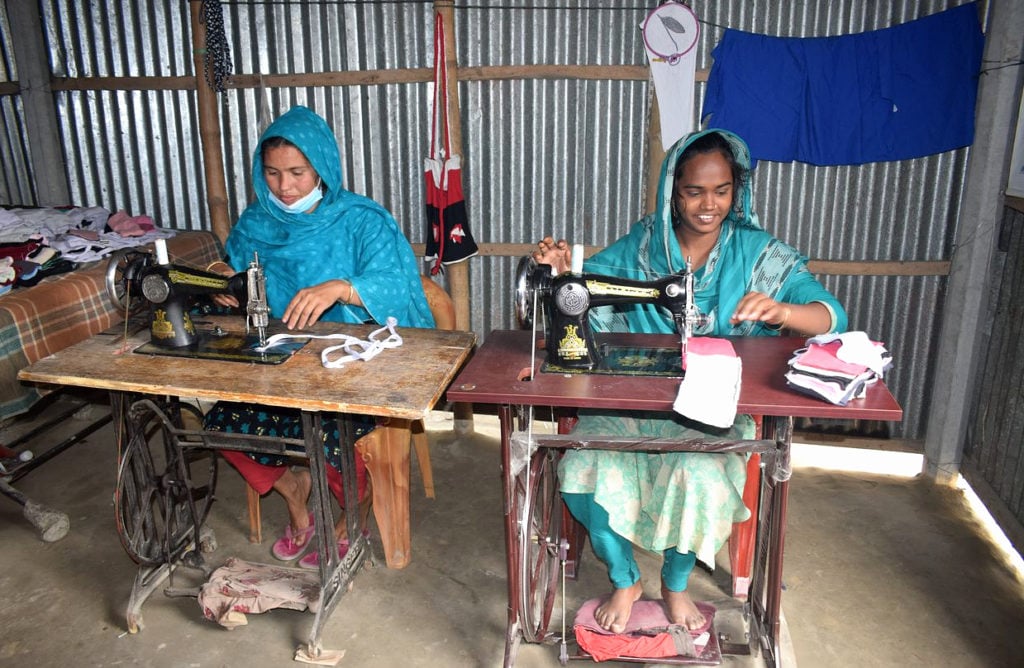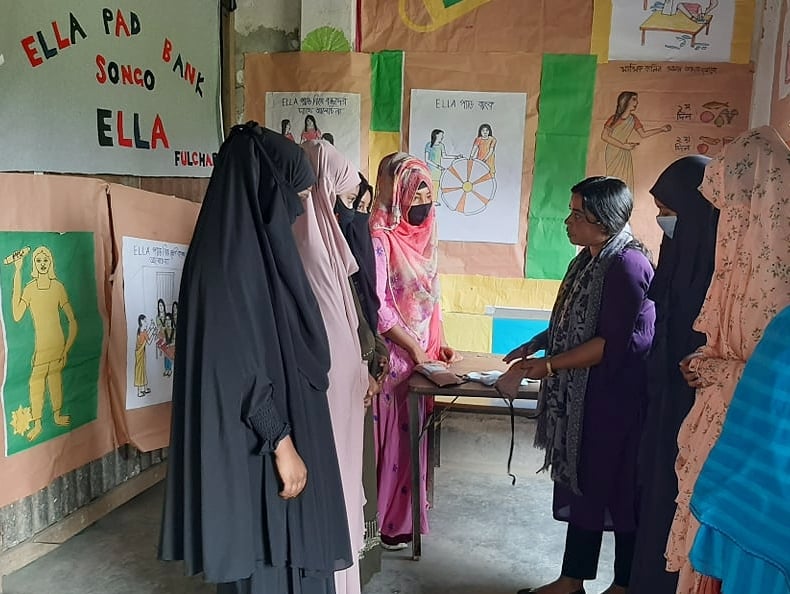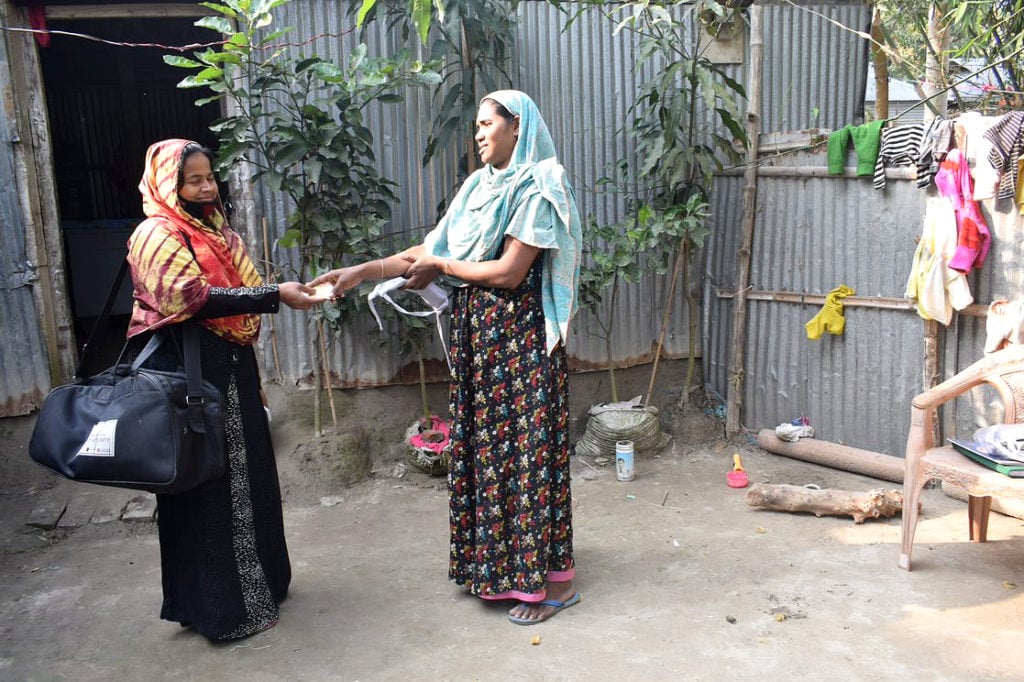Access to affordable menstruation products is a right, not a privilege. Yet, in Bangladesh poverty and social taboos force half of the adolescent girls and 64% of the women to use unhygienic old rags to manage their menstruation. This period poverty comes with illnesses, school absenteeism, and pungent social injustice. Cordaid helps to curb the tide with a simple yet revolutionary sanitary pad.

Especially in the underprivileged coastal and river chars, the riverine and silted landmasses where floods regularly displace communities, period poverty comes on top of many other challenges.
A recent research paper on menstrual hygiene practices in Bangladesh adequately sums up some of these challenges. “Low-quality sanitary materials, the social culture related to menstruation hygiene management, inadequate water, sanitation and hygiene (wash) facilities, lack of guidance and privacy for changing and washing at school or home are common issues related to inadequate menstrual hygiene practices.”
Combining entrepreneurship, care for the planet, and social justice
In two char districts, Gaibandha and Kurigram, Cordaid is now combating period poverty, promoting women’s entrepreneurship, and investing in zero waste sanitary pads all at the same time. How? By making the existing concept of the Ella pad – the eco-friendly low-cost liquid absorbent sanitary pad – available to young girls and women. By training underprivileged women entrepreneurs in producing the reusable pads with leftovers of the garment industry. And by making menstrual hygiene a topic of importance instead of a taboo.
The entrepreneurs that were trained each produce 500 pads a month on average and earn an extra 11.000 Dhaka (100 euros) a month.
Cordaid’s Ella pad initiative in Gaibandha and Kurigram districts, which is part of a bigger EU-funded programme (Sustained Opportunities for Nutrition Governance, or SONGO), draws a lot of attention from social innovators. In fact, it has received the honourable mention award in the category of Best Social Innovation in Bangladesh Innovation Award 2022, an event organized by the Bangladesh Innovation Conclave.
This video shows some of the producers and consumers of the biodegradable Ella pad:
Galiba Rabbani and Arfina Aktar, both based in Bangladesh and closely involved in the initiative, shed more light on the initiative.
“The idea of the Ella pad as a social and zero waste initiative run by poor working women comes from social investor Mamunur Rahman. Cordaid took it to the remote and underprivileged char areas. We engaged female entrepreneurs in Gaibandha and Kurigram with the Ella pad social enterprise,” Galiba explains.
The supply-side
12 women entrepreneurs, each coming from a different village have been trained in producing the pads and have improved their sales and business skills. They, in turn, can share their knowledge with other women, thus expanding the initiative. The Ella pad enterprise assures a sufficient supply of garment waste material and shares the technical expertise needed to produce the pads.

“The entrepreneurs that were trained each produce 500 pads a month on average and earn an extra 11.000 Dhaka (100 euros) a month. That alone covers important household costs, like food and education. “At the moment, they still receive the raw material, the garment leftovers, for free. Once we have passed the pilot phase and the women’s businesses are strong enough, they will have to pay for that,” says Arfina.
The Ella pad example, when massively followed, could save the earth a lot of trouble.
That is the supply side. But what about demand? Where do the eco-friendly pads end up? To women and girls for whom a comfortably shaped, reliable, and affordable sanitary product means a whole lot more than most of us suspect. It brings comfort, relief, freedom, mobility.
Period poverty is a cause of school absenteeism
“Especially in the marginalised rural char areas taboos and harmful cultural practices are stronger than in the big cities. Poverty is more rampant,” Arfina adds. “Menstruation comes with social taboos and restrictions. For example, you can’t eat eggs or meat. Or worse, some parents keep their daughters inside. They can’t go out when they have their period. Traditionally, but also out of sheer poverty, girls use totally inconvenient pieces of old cloth or other solutions to absorb menstrual blood. It doesn’t work well, it’s unhygienic and it only adds to the shame and the stigma. Girls lose out on classes because of this.”

A 2019 study showed that poor menstrual hygiene management including the lack of sanitary pads are important factors of school absenteeism among adolescent girls in Dhaka. In the more traditional and conservative rural areas, like Gaibandha, poverty and social taboos are much more pressing. There, period poverty robs millions of women and girls of educational and other important opportunities in life.
School pad banks
This is why the school pad banks are such an important part of Cordaid’s initiative. With six schools so far, we have managed to set up an Ella pad corner. The pads are stored in a wheel-like construction, symbolising the period cycle. Girls can go there to procure reusable pads in packs of four. They’re three times cheaper than the commercial disposable plastic pads. “It’s a safe corner,” Arfina adds. “For each pad bank, there’s a small committee of a teacher and a few students who manage the corner. They also organise awareness sessions and tackle issues of stigma and shame. In Bangladesh, these sanitary pad banks in schools really are a novelty.”
Frontline work of the nutritious sales agent
About 10% of the Ella pad production finds its way to these school banks. Another 10% is sold directly by the female entrepreneurs involved in the project. But most of the pads find their way to the remotest of char villages and displaced communities, thanks to that inestimable frontline worker of social change in Bangladesh, the nutritious sales agent. They go from door to door, selling key items in places that have no shops. Like baby food, nutrition and hygiene packages, primary health items, contraceptives, prepaid phone cards. And the eco-friendly and reusable sanitary pad.

“The NSAs we work with sell the Ella pads at a slightly higher price than in the school pad banks. They must earn something. But it’s still a lot cheaper than in most commercial shops. But the real added value of the NSA is that through them we have access to the most isolated and marginalised communities,” says Galiba.
Planet-friendly in three ways
The Ella pad project in the char districts is about more than combating poverty, shame, and social injustice. It is also about ecology. In fact, looking at the global menstrual product industry, the Ella pad example, when massively followed, could save the earth a lot of trouble.
Single-use commercial menstrual products are a cornucopia of plastics. They take hundreds of years to decompose, and billions of sanitary napkins end up in landfills and oceans every year. 12 billion annually in India alone. As they slowly break down, their micro-plastics contaminate soil, water, and the air we breathe.
“In the end, access to safe, ecological, and affordable menstrual products brings relief, comfort, and more freedom to every single user.”
The Ella pad is the opposite of that, being a green alternative in diverse ways, as Galiba explains: “First of all if it were not for the Ella pads, the garment waste material they are made of would be burnt. Secondly, the Ella pad is not only made of bio-degradable waste but also reusable. You can just wash it with soap and use it again. Thirdly, it contains no chemicals or plastics. Environmentally, this is a win-win-win product.”
There is also the matter of colour. “Women and girls like them because they are affordable and comfortable, and because they’re not white, like most disposable plastic pads. They come in many colours, but not white,” Arfina says.
Ambitions to take things further
Along with bringing the Ella pad to the char districts of Gaibandha and Kurigram, Cordaid is parallelly piloting it among Rohingya refugees in Cox’s Bazar. “That went very well too,” explains Galiba. “Now, we have ambitions to scale up and take things further. Together with the Ella pad social enterprise, we can improve production models. We can also engage with more female entrepreneurs, and expand distribution and sales networks. By doing that we are fighting poverty and promoting social justice. Because in the end, access to safe, ecological, and affordable menstrual products brings more than comfort. It brings freedom to every single user,” she concludes.
The Ella pad project in Gaibandha and Kurigram districts is part of the EU-supported programme Sustained Opportunities for Nutrition Governance (SONGO).
